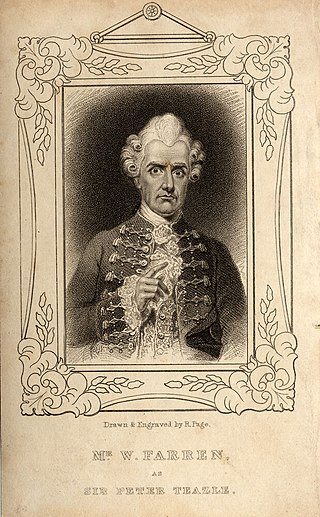
David Garrick was an English actor, playwright, theatre manager and producer who influenced nearly all aspects of European theatrical practice throughout the 18th century, and was a pupil and friend of Samuel Johnson. He appeared in several amateur theatricals, and with his appearance in the title role of Shakespeare's Richard III, audiences and managers began to take notice.

The Theatre Royal, Drury Lane, commonly known as Drury Lane, is a West End theatre and Grade I listed building in Covent Garden, London, England. The building faces Catherine Street and backs onto Drury Lane. The present building, opened in 1812, is the most recent of four theatres that stood at the location since 1663, making it the oldest theatre site in London still in use. According to the author Peter Thomson, for its first two centuries, Drury Lane could "reasonably have claimed to be London's leading theatre". For most of that time, it was one of a handful of patent theatres, granted monopoly rights to the production of "legitimate" drama in London.

The Tragical History of King Richard Iii, Alter'd From Shakespeare (1699) is a history play written by Colley Cibber. It is based on William Shakespeare's Richard III, but reworked for Williamite audiences.
John Bowman (1651–1739) was a British stage actor. He began his career in the Duke's Company at the Dorset Garden Theatre. In 1692, he married Elizabeth Watson, who acted under the name Elizabeth Bowman. He later switched to act at the Drury Lane Theatre. He is also referred to as John Boman.
Roger Bridgewater was a British stage actor of the eighteenth century. He worked as party of the Drury Lane company for many years, specialising in dramatic roles, before switching to Covent Garden in 1734. In later years he frequently played Falstaff.
Jane Cibber was a British stage actress.
Henry Giffard was a British stage actor and theatre manager.
William Mills (1701–1750) was a British stage actor.
William Milward (1702–1742) was a British stage actor.
Thomas Chapman (1683-1747) was a British stage actor.
Thomas Hallam was a British stage actor.
Samuel Cautherley (c.1747–1805) was a British stage actor. His surname is sometimes spelt as Cautherly.
Joseph Williams was an English stage actor of the seventeenth and early eighteenth century.
Elizabeth Willis (c.1669-1739) was a British stage actress.
Margaret Mills was a British stage actress of the late seventeenth and early eighteenth century.
John Whitfield (1752–1814) was a British stage actor.
Mary Whitfield was a British stage actress.
Elizabeth Hopkins (1731–1801) was an English stage actress of the eighteenth century. Born as Elizabeth Barton to a publican in York, she married the actor William Hopkins in 1753. and he introduced her to the stage. They acted together in the provinces and then in Edinburgh where she was original Anna in John Home's Douglas in 1756. She then went to Dublin to perform at the Smock Alley Theatre and elsewhere, although she was at one point dismissed by the company by Thomas Sheridan. When her husband was appointed as prompter at the Theatre Royal, Drury Lane in London she joined the company there, making her first appearance there in 1761. For several decades she was an integral part of the Drury Lane company, occasionally appearing elsewhere in the summer including at Richmond and the Theatre Royal, Haymarket. She transitioned in the 1780s from the younger, tragic roles she had played to older character parts such as dowagers Her final appearance was at the Haymarket in 1796. The actress Priscilla Kemble, wife of John Philip Kemble, was her daughter.

William Farren (1754–1795) was an English stage actor of the eighteenth century. He was born in London to a chandler from Clerkenwell. He made his debut at the Theatre Royal, Drury Lane in London in 1775, likely due to the influence of the actor Richard Yates and remained there until 1784 when he transferred to the rival Theatre Royal, Covent Garden. A notable early role at Drury Lane was the original Careless in Sheridan's The School for Scandal. He remained at Covent Garden until his death in 1795, making occasional summer appearances at the Haymarket. He played a mixture of supporting roles and occasional leads, and developed a reputation as a versatile actor who could appear in comedy and tragedy. He died of pneumonia and was buried at St Paul's Church in Covent Garden. His son William Farren also became an actor, and the father is sometimes known as William Farren the Elder to distinguish him.
William Davies (1751–1809) was an English stage actor and singer. Born in London, Davies began his career in the provinces including at Norwich before coming to Richmond Theatre in the summer of 1770. He made his London debut at the Theatre Royal, Drury Lane in September that year and joined the company which was under the management of David Garrick and later Richard Brinsley Sheridan. In 1780 he transferred to the company of the Theatre Royal, Covent Garden and remained there for the next fourteen years, interspersing it with summer appearances at the Haymarket where he continued to appear until 1799. He died in 1809 was buried at St Paul's Church in Covent Garden. His wife Elizabeth Davies also acted alongside him at Norwich and Drury Lane before her death in 1782.



